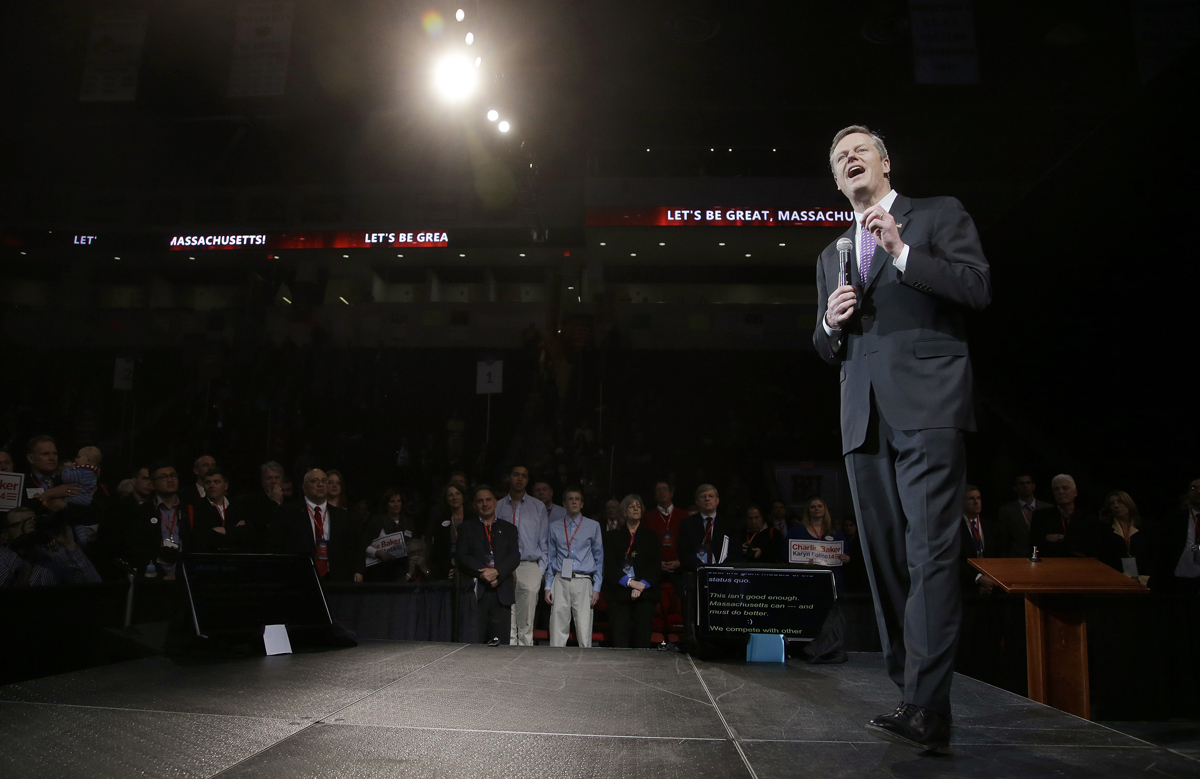Will Bland Efficiency Work for the MassGOP?

Charlie Baker Photo via AP
I wasn’t there for Charlie Baker’s convention speech Saturday. I bailed after putting in a solid five-plus hours inside BU’s Agganis Arena, during which time the Massachusetts Republicans had fallen more than two hours behind schedule. Baker went on 45 minutes after the originally scheduled closing gavel time of 2:30 p.m., with balloting still to come.
It wasn’t a strong argument for Baker’s main argument: that he can run things with greater competence and efficiency than the state’s Democrats.
State party conventions commonly run behind schedule, to be sure. But I had foolishly hoped that punctuality would be the compensation for lack of drama. Aside from Governor, the party had just one contestant for each of the other statewide office endorsements—an entire undercard of forfeitures—none of any power or influence (or hope of victory), so there should have been no trouble holding them and their official nominators to schedule, as well as the party-prepared speeches and presentations.
And it wasn’t like anyone was being interrupted by unexpected bursts of sustained applause.
This was, more or less by design, a staid and uninspiring convention. The state party is entirely Baker’s now, with Mitt Romney gone out to pasture and Scott Brown self-deporting to New Hampshire. And Baker’s plan to win in 2014 is clearly to minimize and de-emphasize interesting things like policy differences, and make the election about competence and efficiency. The pitch in sum: When you put Democrats in charge of everything on Beacon Hill, they inevitably do a bad job running things—witness the Department of Children and Families (DCF) revelations, the health connector website fiasco, and the probation patronage scandal—so you should elect one non-Democrat managerial type to keep things in order.
There is a strong argument to be made for that approach. It fits Baker’s perceived skill set. It skirts the policy debates that Massachusetts Democrats have used to advantage in recent elections. It counters inevitable Democratic attempts to place the election in national context, which can be a death blow in a state where the national Republican brand is roughly as popular as hemlock. It takes the various governmental problems that Bay Staters tend to dismiss as isolated or inevitable episodes, and forms of them a narrative to justify citizen electoral response. It further extends that storyline to Democrats generally, and thus beyond the present occupier of executive power, Deval Patrick, who not only maintains the electorate’s stubborn approval, but is also, however guilty of malfeasance, not the voter’s actual alternative to putting Baker in charge for the next four years.
So competence and efficiency are most likely wise themes for Baker to infuse his campaign and the party with. But they aren’t very exciting.
The attendees and officials I spoke with would not particularly disagree with that assessment; this convention was not achieving the usual goal of energizing and enthusing the party activists for the work ahead. The speeches throughout the day were almost entirely devoid of anything that might provoke emotional response among weary battlers for the underdog cause. There were few jokes about Patrick’s failures—or few jokes at all, really. There was barely anything about likely gubernatorial opponent (and popular punchline), Martha Coakley. Not even a reference to Elizabeth Warren’s claims to Native American heritage. I heard almost nothing from the stage about immigrants, or even the sure-fire crowd-pleasing phrase of the 2010 convention: “bathroom bill.” Even Republican National Committeewoman Chanel Prunier steered clear of gays and fetuses, and Prunier really cares about gays and fetuses.
There was substantial buy-in among the attendees for the bland approach. Certainly this audience lacked the underbelly of sharp opinions that seeped into that Worcester convention, proudly displayed on signage, clothing, stickers, pins, and hats, and in a few inappropriately timed heckles. By contrast, there was very little Tea Party feel in Agganis—or outside, where attendees were greeted by an eerie absence of sign-holders, signature-seekers, and literature-distributors (with the lone exception of arts-promoting Create The Vote). The closest thing to nasty messaging I saw inside Agganis was directed at Common Core.
Perhaps that was in part due to the selective effect of the convention logistics, as I suggested might happen—but there was nonetheless a strong sense of conservatism being tamped down for a greater good. (Indeed, the most interesting drama of the convention was the off-stage ramping up of efforts for conservative takeover of Republican House and Senate leadership; more on that another time.) State representative Keiko Orrell spoke to me about “solidarity and unity” and “putting differences aside.” Others, from top officials to grassroots activists, echoed the sentiment.
That acquiescence to the drab helps explain the inability of unapologetic conservative Mark Fisher to win the 15 percent delegate vote required to qualify for the primary ballot—”We’re more with Fisher ideologically, but will vote for Charlie,” two Blackstone Valley stalwarts told me—although he came close enough to warrant the challenge he plans to bring.
Attendees were clearly on heightened sensitivity not only because of media reports (and harsh reality) of internal divisions of the state GOP, but also because of the troublesome announcement that congressional candidate—and Lieutenant Governor nominee from that 2010 campaign—Richard Tisei was boycotting the convention, to protest the strengthening of the party platform’s language on abortion and marriage.
“It’s a nominating convention for me, not for him,” Baker said when I asked him about that boycott in the concourse that morning. He downplayed any notion of division: “This has always been a big-tent party, with the biggest tent pole being fiscal discipline” and the competence and efficiency that Baker calls “blocking-and-tackling stuff.”
Again, that’s not exactly a phrase that stirs anyone to passionate support. But, it’s possibly the kind of thing that will win him and his party a new chance in November.


